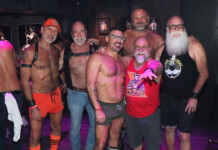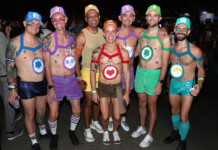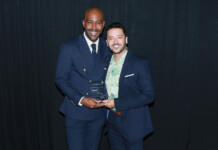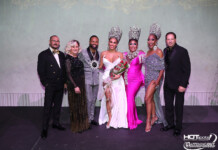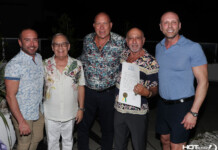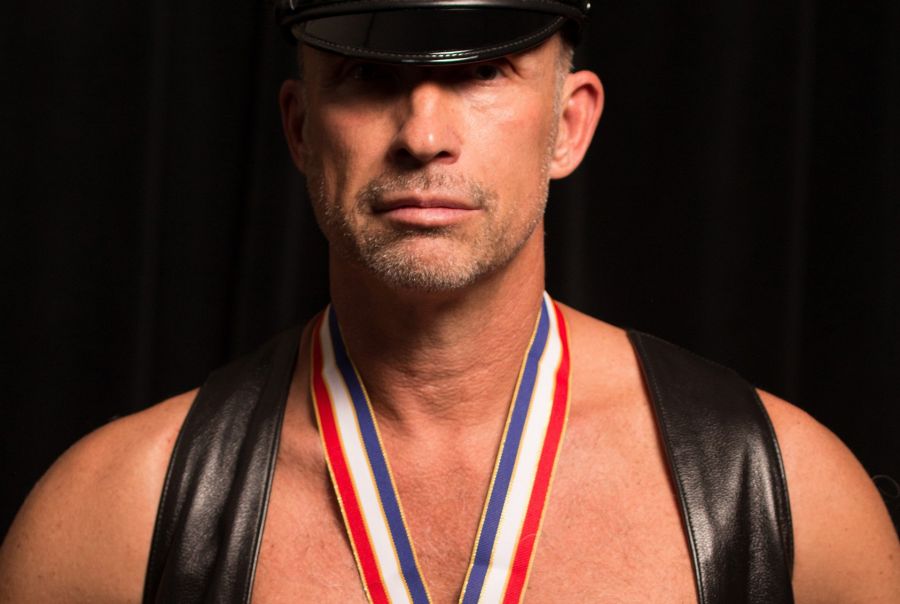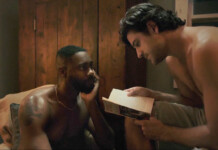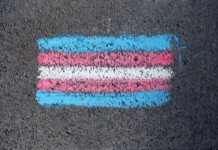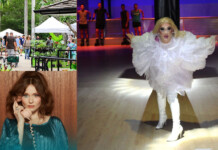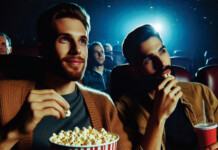David Richwine is an HIV nurse, educator, and healthcare policy advocate who works for leading pharmaceutical manufacturer Bristol-Myers Squibb in the position of National Advocacy and Policy Lead, U.S Virology. He is also a leather title holder, currently reigning as Mr. Ramrod.
An honors graduate of New York University’s College of Nursing, Richwine is a long-time LGBT rights activist and Army veteran. An avid amateur athlete, he has competed at three Gay Games and one World Outgames in cycling and marathons, garnering a total of four gold, three silver and one bronze medals. Currently he is seen frequently on the tennis courts at Hagen Park in Wilton Manors. Hailing from Pittsburgh, Pennsylvania, Richwine spent most of his adult life living in NYC, relocating to Fort Lauderdale 12 years ago. He is openly sober and openly on PrEP. It was a pleasure to sit down with David for this Hotspots exclusive interview, just weeks before he travels to compete in International Mr. Leather (IML) in Chicago.
Q: Did you always want to be a nurse? What prompted you to get your degree in nursing?
A: No, all through high school I wanted to be a horse trainer. I had some success at that in Pennsylvania, where I grew up, and in Kentucky. It was a dream job for me. The decisions to enlist in the Army and go to nursing school were a direct result of the HIV epidemic. The Army, because I always wanted to – and, like many gay men in 1984, I had no idea what was next, so I joined the army. I made the decision to go to nursing school later.
Q: How long were you in the U.S. Army? Tell us about that experience…
A: I was on active duty for four years. I loved being in the Army as I loved the discipline, the order and chain of command. Of course, I had to be closeted – it was 1985, even pre- “Don’t Ask, Don’t Tell”. But I was stationed at a big Army Medical Center, Fitzsimmons, in Denver and most people just looked the other way, even my Colonel. I pretty much openly dated an officer, also a no-no, a captain. I was an E-4 (enlisted 4), basically a corporal, called a specialist. I was in the pharmacy and a bit of a star because I always got a perfect score, a 300, on my bi-annual physical fitness test every single time. In January 1989 I was due to re-up. My next station would be Hawaii. I really wanted to go to Hawaii. One day my colonel came up to me in the pharmacy and asked me to take a walk with him. I’ll never forget the sadness and kindness in his voice when he said, ‘I never thought I could like a man like you (meaning gay), but I do. I have to recommend you don’t re-up. Under [my command] I can protect you, but someday someone’s going to call you on this thing and you’ll end up with a dishonorable discharge, or worse, and you don’t deserve it.’ Even now, it brings tears to my eyes. I left active duty with an honorable discharge and went into the reserves, were I stayed for seven more years.
Q: You work in the HIV field as a nurse, treatment educator and as a policy advocate. How long have you been working in the field and how rewarding are these jobs?
A: I’ve been involved in one way or another for over 30 years. After the Army, I took a couple of years to decide between nursing school and pharmacy school. At the time there was no treatment and I wanted to work directly with the people living with AIDS, so I chose nursing. At first, during school rotations and later when I started working on the unit, it was a revolving door of patients who didn’t make it. When combination therapy came out a couple years later, the very same guys – most of my patients were guys – that wouldn’t have made it did a complete turnaround and were able to get out of the hospital and stay out. My belief in HIV treatment, based on seeing that change first-hand, is unshakable. That’s why when the pharmaceutical companies offered me the job of doing direct patient treatment education, I jumped on it. I’ve been very fortunate to have a job for the past 18 years that is emotionally rewarding every single day. For the past four of those years, I’ve worked directly with HIV policy advocates. Many of these are people I’ve admired for years. The opportunity to contribute in this way now, as I approach the end of my own career, well I can’t describe how good it makes me feel. A couple of years ago, I sat next to long-time AIDS activist, Matt Sharp, at a company meeting. We had a brief conversation about AIDS Survivor Syndrome that resulted in The ReUnion Project, a project focused on the psycho-social issues of long-term survivors, both positive and negative, of the epidemic. The project had a very successful summit in collaboration with The Pride Center here in Fort Lauderdale in January. I attended the opening event in gear, in my role as Mr. Ramrod.
Q: How were the experiences competing in the Gay Games and World Out Games and how did it feel to win all those medals?
A: I believe the Gay Games are still the second largest amateur sporting event in the world. Everything – from the opening to the closing ceremonies – is a source of pride for me. My first Gay Games was in Amsterdam in 1998. I ran the marathon. It was my first one and just finishing was a big deal for me even though I didn’t get a medal. I ran four more. My best marathon time, 3:56:13 was in the Chicago Marathon in 2000. I was injured, but knew I was on a good time and kept going. Unfortunately, that also made it my last marathon. I had a planter fascist and had to give up running. That’s when I took up cycling. One of the guys I rode with all the time in NYC was planning to go to Sydney in 2002. I decided to go with him and that’s where I won my first medal, silver, in the individual road event. I immediately starting looking toward 2006, which was the same year the organizer pulled the games from Montreal and moved them to Chicago. I won gold in all three of my events in Chicago, but unquestionably, I’m most proud of the team time trial gold I won with my three teammates! Two weeks later, Montreal held the first World Outgames. I also competed in that, winning a gold and a silver.
Q: How did you get into the leather community?
A: I became interested in the leather community when I moved to Wilton Manors 12 years ago and started going to Ramrod. I liked the vibe a lot. I bought my first pair of chaps… I love the way leather feels against my skin and love the way guys look in it. I’d go to Ramrod a lot and The Leather Mask Ball, and would hit the leather bars when I traveled, but didn’t really connect until I attended Leather Pride Weekend in Palm Springs in October 2015. We had a ReUnion Project Summit planned there two days after Halloween Weekend. One of the other project organizers that lives there casually mentioned it was Leather Pride Weekend. I was recently single and thought that would be a good way to let go. I went to all the events, met many of the contestants and most importantly the current 2015 IML titleholder, Patrick Smith. He gave the keynote opening speech at the final event speaking about his work in LGBT rights in underdeveloped countries or those with particularly harsh laws. He had just returned from Uganda. I had no idea you could use the IML platform for that level of activism. Speaking with him later that evening at the victory party I heard myself say the words, “I’m going to run for IML in 2017…I want to raise awareness around AIDS Survivor Syndrome.” When I got home I went to LeatherWerks and announced my intentions to Jason Pelky, a long-time, well-respected member of the leather community and customer gear designer. He agreed to provide guidance (he still does) and we got busy putting together more gear for me. I have a lot of gear and boots, 12 pairs now, and thanks to Jason and other mentors such as Bill Hoeppner, Bearman (LeatherWerks owner), Scot Blumstien and Kirk Ruben a lot more information. Bill and Kirk are both past Mr. Ramrod’s and IML contestants. Bill was 2nd runner the year he competed.
Q: How did it feel when you won Mr. Ramrod?
A: They announce the winner, first- and second runner-up in reverse order. After they announced the first runner up, my heart rate jumped. I thought, ‘you might win this!’ Then they announced my name and everything after that is a blur. I couldn’t believe it! It was particularly special because Patrick Smith, 2015 IML, and my inspiration to begin this journey, was one of my judges.
Q: How excited are you to go to Mr. IML, and specifically to represent the Ramrod?
A: I can’t wait as I’ve met most of my class brothers, and they are all special guys. Any one of us could win. I know its cliché, but it really is an honor just to compete, to represent my bar, Ramrod and my other sponsors LeatherWerks, Stompers Boots, AniceteDesign and my South Florida leather brothers.
Q: What’s ahead for David?
A: That depends a lot on what happens in Chicago on Sunday, May 28th. Either way, I’ll be honored to represent Ramrod in the Pride Parade here. I also have plans to go to Madrid for the last couple days of World Pride and I retire at the end of the year. I’m working on two certifications as part of a project I’ve named David Unbound: the first is personal trainer and the other is life coaching. My goal is to help other guys around my age look at where they are, emotionally, physically and spiritually, where they like to be and map a plan to help them get there. The website is coming soon: davidunbound.com.

